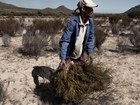A coalition of environment groups called Tuesday for the world's largest marine reserve to be declared in Antarctica's Ross Sea to prevent "industrial scale" fishing ruining the pristine ecosystem.
The Antarctic Ocean Alliance said waters surrounding the remote frozen continent were facing increased exploitation as fish stocks elsewhere in the world continue to decline.
 Full Story
Full Story
Fossilized remains of one of the largest penguins ever, an "elegant" giant standing 1.3 meters (52 inches) tall, have been found in New Zealand, scientists said Tuesday.
The penguin lived 27-24 million years ago, when New Zealand was mostly underwater and consisted of isolated, rocky outcrops that offered protection from predators and plentiful food supplies, researchers said.
 Full Story
Full Story
Poles have turned to cyberspace to circumvent a new animal rights law in Poland forbidding the sale of dogs and cats without a breeding license, which had been intended to stamp out cruelty to animals.
The law, which came into force on January 1, was intended to tackle the appalling conditions in which some unlicensed breeders kept their animals.
 Full Story
Full Story
The destruction of Brazil's Antarctic base in a fire that killed two navy personnel has dealt a major blow to the country's strategic research on the resource-rich continent, experts say.
"All the central core of the base, where the installations were concentrated, was lost. The exact extent of what occurred still needs to be determined, but the assessment is that we really lost virtually everything," Defense Minister Celso Amorim said late Saturday.
 Full Story
Full Story
For the past two decades, the U.S. space agency has been practically obsessed with Mars. It has hardly missed an opportunity about every two years to fling robotic spacecraft at the red planet.
This summer, the most high-tech rover ever, Curiosity, will land near the Martian equator in search of the chemical building blocks of life. The more scientists study Mars, the closer they get to answering whether microbial life once existed there, a clue to the ultimate question: Are we alone?
 Full Story
Full Story
Farm workers swing their sickles through red branches, bundling them up before laying them out in the sunshine to dry.
The annual harvest at Groenkol Rooibos tea estate, in South Africa's Western Cape helps quench the world's growing thirst for "red bush" tea, but farmers fear that climate change could destroy the delicate eco-system that their crop depends on.
 Full Story
Full Story
An explosion caused by a fire left one navy personnel wounded and two others missing at a Brazilian base in Antarctica early Saturday and forced dozens of researchers to evacuate, authorities said.
The Brazilian Navy said the fire broke out in a room housing energy generators of the Comandante Ferraz Antarctic Base, a research station located in Admiralty Bay, King George Island, near the tip of the Antarctic Peninsula.
 Full Story
Full Story
The World Bank on Friday said the world's oceans were at risk and called for a coalition of governments, NGOs and other groups to protect them, aiming to raise $1.5 billion in five years.
"The world’s oceans are in danger," from over-fishing, marine degradation and loss of habitat, World Bank president Robert Zoellick said. "Send out the S-O-S: We need to Save Our Seas."
 Full Story
Full Story
Stargazers of the world are getting a treat this weekend.
On Saturday and again Sunday, Venus, Jupiter and Earth's moon converge for a brilliant night show.
 Full Story
Full Story
The collapse of the Mayan civilization was likely due to a relatively mild drought, much like the drier conditions expected in the coming years due to climate change, scientists said Thursday.
Scholars have long believed that a major drought caused severe dry conditions that killed off the ancient culture known for its mastery of language, math and astronomy.
 Full Story
Full Story



